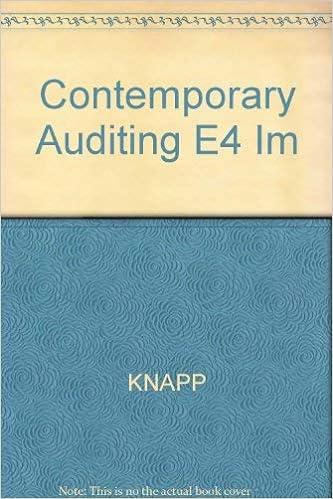Question
5. In a complete liquidation a shareholder receiving multiple distributions will recognize loss when: A.__ He receives a distribution greater than his stock basis B.__
5. In a complete liquidation a shareholder receiving multiple distributions will recognize loss when:
A.__ He receives a distribution greater than his stock basis
B.__ He receives the first distribution and allocates the loss
C.__ He receives the last distribution
D.__ He receives the first distribution
6. In a complete liquidation where the transaction is kept "open due to uncertainties", when the transaction closes:
A.__ The total gain or loss will be the same as if the transaction has closed originally and the character of the gain or loss will always be the same
B.__ The total gain or loss will be the same as if the transaction has closed originally and the character of the gain or loss will never be the same
C.__ The total gain or loss will be the same as if the transaction has closed originally and the character of the gain or loss may be the same
D.__ The total gain or loss may be different but the character of the gain or loss will always be the same
7. In a complete liquidation where a shareholder assumes debt as part of the liquidating distribution:
A.__ He will increase his recognized gain by the amount of the debt
B.__ He will decrease his recognized gain by the amount of the debt
C.__ He will increase his basis in the property by the amount of the debt
D.__ He will decrease his basis in the property by the amount of the debt
8. If property was contributed to a corporation in a 351 transaction with a basis of 10 and a FMV of 3 and then distributed pro rata in a complete liquidation to a majority shareholder within 5 years of being acquired:
A.__ The corporation will recognize loss on the complete liquidating distribution
B.__ The shareholder will recognize loss on the transaction
C.__ The corporation will not recognize loss on the complete liquidating distribution
D.__ The corporation will defer deducting the loss into the future.
9. If a "C" corporation converts to an "S" corporation with appreciated assets at that time:
A.__ The "C" corporation will recognize loss on the complete liquidating distribution
B.__ The "S" corporation will recognize loss on the "C" corporation's complete liquidation
C.__ The "C" corporation will be taxed on its built in gain due to the conversion
D.__ The "S" corporation may recognize gain in the future due to the appreciated assets.
10. If a corporation liquidates and reorganizes, the expenses of the liquidation and reorganization:
A.__ Generally are fully deductible in the year paid
B.__ Generally are totally deferred and not deductible in the year paid
C.__ Generally will be partly deductible in the year paid
D. __ Generally will never be deductible
Step by Step Solution
There are 3 Steps involved in it
Step: 1

Get Instant Access to Expert-Tailored Solutions
See step-by-step solutions with expert insights and AI powered tools for academic success
Step: 2

Step: 3

Ace Your Homework with AI
Get the answers you need in no time with our AI-driven, step-by-step assistance
Get Started


